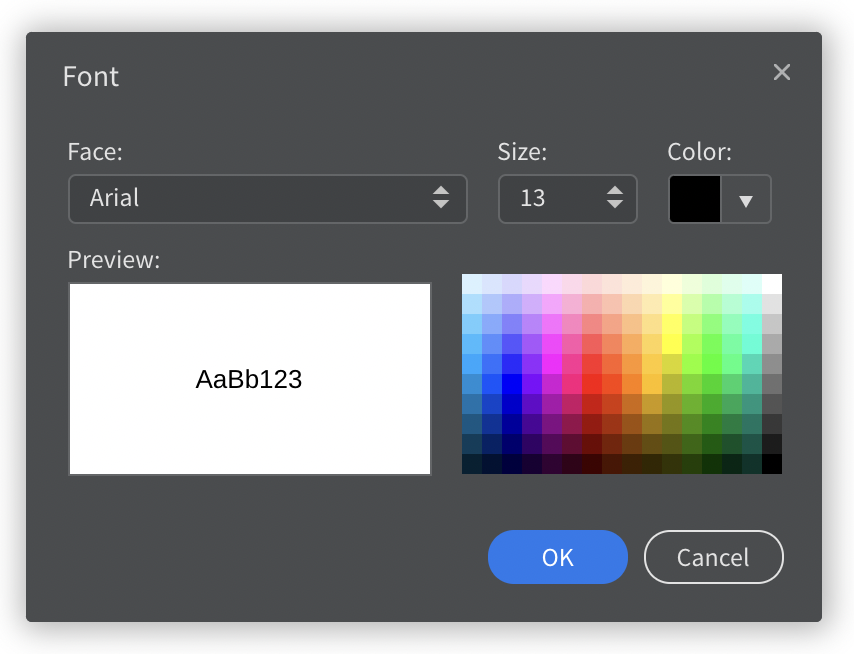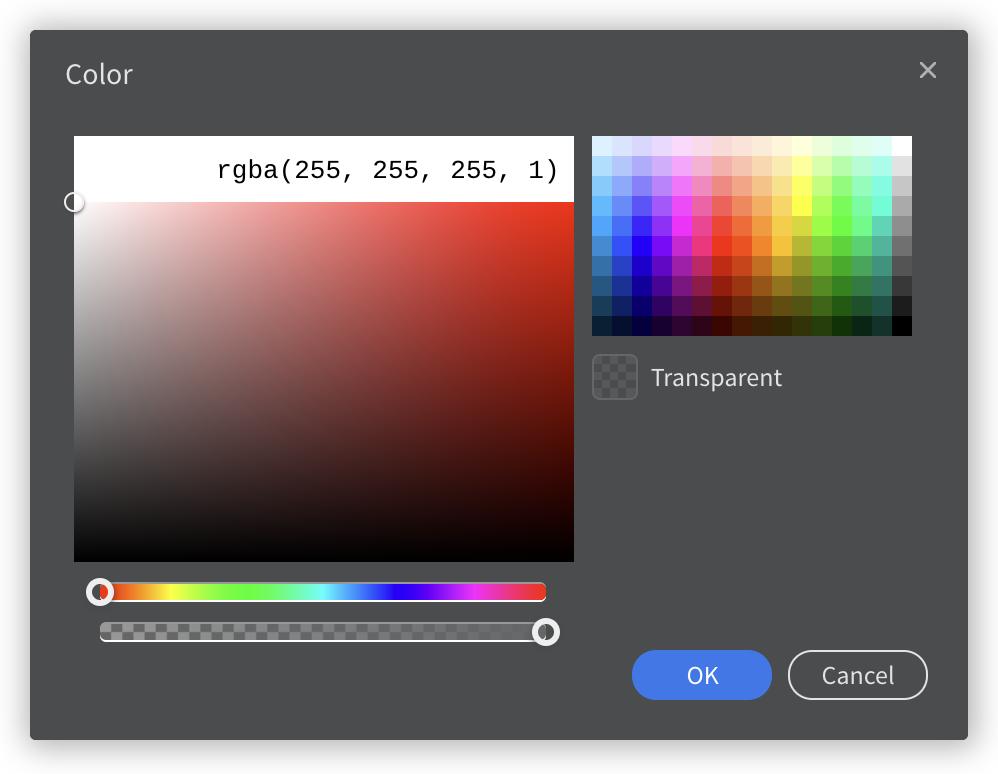Formatting Elements
Change Font
To change font face, size, and color of view elements:
Select view elements in diagram.
Show Font Dialog by pressing
Ctrl+Shift+For selecting Format | Font... in Menu Bar or Context Menu.Select font face, size or color and press OK button.

You can also use Style Editor to change Font face, size, and color.
Change Line Color
To change line color of view elements:
Select view elements in diagram.
Show Color Dialog for line color by pressing
Ctrl+Shift+Lor selecting Format | Line Color... in Menu Bar or Context Menu.Select line color and press OK button.

You can also use Style Editor to change line color.
Change Fill Color
To change fill color of view elements:
Select view elements in diagram.
Show Color Dialog for fill color by pressing
Ctrl+Shift+Ior selecting Format | Fill Color... in Menu Bar or Context Menu.Select fill color and press OK button.
You can also use Style Editor to change fill color.
Change Line Style

To change line style of view elements:
Select view elements in diagram.
Select one of line styles.
Rectilinear - Press
Ctrl+Lor select Format | Line Style | Rectilinear in Menu Bar or Context Menu.Oblique - Press
Ctrl+Bor select Format | Line Style | Oblique in Menu Bar or Context Menu.RoundRect - Press
Ctrl+Alt+Lor select Format | Line Style | RoundRect in Menu Bar or Context Menu.Curve - Press
Ctrl+Alt+Bor select Format | Line Style | Curve in Menu Bar or Context Menu.
You can also use Style Editor to line style.
Set Auto Resize
To set view elements always resize automatically:
Select view elements in diagram.
Press
Ctrl+Shift+Ror check (or uncheck) Format | Auto Resize in Menu Bar or Context Menu.
You can also use Style Editor to line style.
Set Inherit Style
Typically the style (font, color, etc.) of attributes and operations is inherited from the class view. If you want to set different style of some attributes or operations from the class, turn off the inherit style property.
To set inherit style of view elements:
Select view elements in diagram.
Press
Ctrl+Shift+Kor check (or uncheck) Format | Inherit Style in Menu Bar or Context Menu.
You can also use Style Editor to line style.
Set Word Wrap
To allow text can be shown in multiple lines:
Select view elements in diagram.
Press
Ctrl+Shift+Wor check (or uncheck) Format | Word Wrap in Menu Bar or Context Menu.
Stereotype Display
An element has six alternative representations based on the stereotype. To change stereotype display:
Select view elements in diagram.
Press
Ctrl+Shift+0~Ctrl+Shift+5or select Format | Stereotype Display | [StereotypeDisplayKind] in Menu Bar or Context Menu.
Supported stereotype display kinds are follow:
None (
Ctrl+Shift+0) : Do not show stereotype.Label (
Ctrl+Shift+1) : Show stereotype as a label.Decoration (
Ctrl+Shift+2) : Show stereotype as a decorated icon on the top left.Decoration with Label (
Ctrl+Shift+3) : Show stereotype as a label with a decorated icon.Icon (
Ctrl+Shift+4) : Show element as a icon.Icon with Label (
Ctrl+Shift+5) : Show element as a icon with label.

Show Visibility
To show (or hide) visibilities:
Select view elements in diagram.
Press
Ctrl+Shift+Vor check (or uncheck) Format | Show Visibility in Menu Bar or Context Menu.
Show Namespace
To show (or hide) namespace:
Select view elements in diagram.
Press
Ctrl+Shift+Nor check (or uncheck) Format | Show Namespace in Menu Bar or Context Menu.
Show Property (Tag)
To show (or hide) properties (tags):
Select view elements in diagram.
Press
Ctrl+Shift+Por check (or uncheck) Format | Show Property in Menu Bar or Context Menu.
Show Type
To show (or hide) types:
Select view elements in diagram.
Press
Ctrl+Shift+Yor check (or uncheck) Format | Show Type in Menu Bar or Context Menu.
Show Multiplicity
To show (or hide) multiplicities:
Select view elements in diagram.
Press
Ctrl+Shift+Mor check (or uncheck) Format | Show Multiplicity in Menu Bar or Context Menu.
Show Operation Signature
To show (or hide) operation signature:
Select view elements in diagram.
Press
Ctrl+Shift+Gor check (or uncheck) Format | Show Operation Signature in Menu Bar or Context Menu.
Suppress Attributes
To suppress attributes:
Select view elements (e.g. Class) in diagram.
Press
Ctrl+Shift+Aor check (or uncheck) Format | Suppress Attributes in Menu Bar or Context Menu.
Suppress Operations
To suppress operations:
Select view elements (e.g. Class) in diagram.
Press
Ctrl+Shift+Oor check (or uncheck) Format | Suppress Operations in Menu Bar or Context Menu.
Suppress Receptions
To suppress receptions:
Select view elements (e.g. Class) in diagram.
Press
Ctrl+Shift+Eor check (or uncheck) Format | Suppress Receptions in Menu Bar or Context Menu.
Suppress Literals
To suppress literals:
Select Enumeration view elements in diagram.
Press
Ctrl+Shift+Tor check (or uncheck) Format | Suppress Literals in Menu Bar or Context Menu.
Suppress Columns
To suppress columns:
Select Entity view elements in diagram.
Press
Ctrl+Shift+Uor check (or uncheck) Format | Suppress Columns in Menu Bar or Context Menu.
Aligning View Elements
To bring view elements on the front:
Select view elements in diagram.
Select Format | Alignment | Bring to Front in Menu Bar or Alignment | Bring to Front in Context Menu.
Or, to send view elements to the back:
Select view elements in diagram.
Select Format | Alignment | Send to Back in Menu Bar or Alignment | Send to Back in Context Menu.
And, you can align two or more view elements:
Select view elements in diagram.
Select Format | Alignment | [AlignmentKind] in Menu Bar or Alignment | [AlignmentKind] in Context Menu.
Align Left : Align selected view elements to the left.
Align Right : Align selected view elements to the right.
Align Middle : Center selected view elements horizontally.
Align Top : Align selected view elements to the top.
Align Bottom : Align selected view elements to the bottom.
Align Center : Center selected view elements vertically.
Layout Diagram
To layout diagram automatically:
Open the diagram to be layout.
Select Format | Layout | Auto in Menu Bar.
If you want to layout diagram in a particular direction:
Open the diagram to be layout.
Select Format | Layout | [Direction] in Menu Bar. Supported directions are Top to Bottom, Bottom to Top, Left to Right and Right to Left.